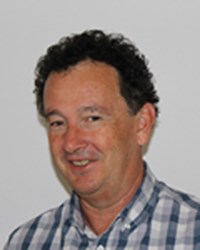Issue 28
Term 1 1999
Bollards to you too: ASLA XVI Conference Report
This report is based on observations by Nigel Paull, Wendy Smith and Keith Gove.
To say that Geelong is a long way from Tamworth is, of course, stating the obvious. It takes a rather large incentive to get me to travel such a distance, particularly in the school holidays.' So said Wendy Smith. Many other participants who made the pilgrimage to the 16th Australian School Library Association (ASLA) conference, held recently in Geelong at the historic Deakin University Woolstore's campus, were of the same mind. For Wendy, the incentive was the invitation to present a paper. Over 500 Teacher-Librarians from all Australian states and territories, New Zealand, Singapore, Canada and the USA found other good reasons to make the pilgrimage.
With almost a hundred presentations and workshops to choose from, participants had a diverse selection of sessions to attend. Comment from colleagues showed they enjoyed the coverage of topics and they found them.to be informative, reflective, creative, challenging and convincing.
Several themes of the Conference were relevant to issues facing SCIS. While some Teacher Librarians may be concerned about their future in the digital age, several sessions stressed the increasing, rather than decreasing, role of Teacher Librarians. Such roles were described as information managers or mediators, navigators, even 'cybrarian' (thanks to Pam Berger, keynote speaker from the USA). Whether individuals take up the challenges inherent in such new roles is in their own hands. One speaker, Mai Lee, offered Teacher Librarians a strategy for preventing their decline into 'endangered species' status. Other speakers echoed the unique position Teacher Librarians have as the initiators of change within their schools.
Pam Berger introduced us to Socrates, a student of the year 2010, who is equipped with a full range of digital equipment and communicates with his learning community across the world. Pam emphasised the need for Teacher Librarians to support the teachers of these students in collaborative and collegiate learning groups by developing the skills of analysis and evaluation of the vast and chaotic mass of information available on the World Wide Web.
Several sessions raised the question of whether or not to catalogue Internet sites. On the one hand, cataloguing provides control over the digital resources, as with physical resources, allowing sophisticated search strategies. But on the other hand, such structure may reduce students' learning opportunities gained by exploring the Internet. The SCIS service is currently still deliberating whether to catalogue Internet sites or not.
The SCIS Oration by Professor Denise Bradley introduced a moral dimension. Rather than the approach of other keynote speakers, who asked 'Here is the technology, what can we do with it?', Denise asked us to consider the questions 'What sort of society do we want?' and 'What future do we want to create?'. She suggested ways in which Teacher Librarians may assist their schools and surrounding communities to develop learning communities of moral and ethical citizens.
Two other keynote speakers, Richard Neville and Frances Awcock, both highlighted the ways in which libraries represent and are custodians of local and national culture. They touched on what this might mean for school libraries. Separate sessions by Keith Gove (Curriculum Corporation) and Ashley Freeman (Charles Sturt University) identified the centrality of subject headings in providing a structure for searching, and, in a sense, a codification of Australian knowledge and culture. Suggestions were made for modifications to the SCIS Subject Headings.
In some ways the image of the future painted by some of the speakers was daunting. How can Teacher Librarians apply their valuable traditional skills and knowledge to the new digital networked world? Several speakers stressed the need to focus on key tasks, such as information literacy programs and other curriculum-related work, and to outsource non-key tasks such as cataloguing. There is a neat parallel between the lifelong learning skills needed by Teacher Librarians for their own professional development. and the skills they should be assisting their school to impart to its students.
The promise of the Conference program was met in many ways. The range and quality of presenters offered was sufficient to interest and enthuse all participants. The trade fair was varied and topical. The venue was functional, yet architecturally appealing.
And the interaction among participants was, of course, stimulating and vital. In addition to the knowledge and skills gained, we also enjoyed the social functions, catching up with colleagues, broadening those ever-important networks, and walks by the bollards on the bay that were such a central symbol of the conference. Congratiatlsions to the organisers for a successful conference.
